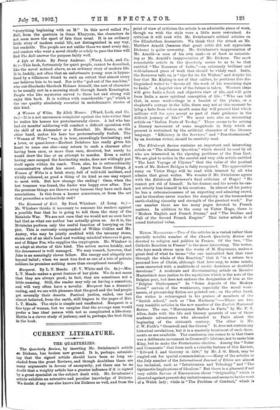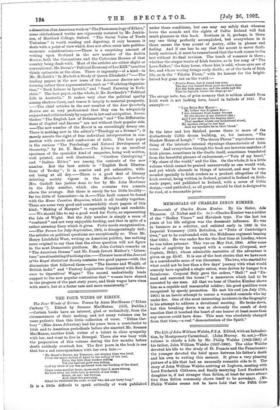MINOR MAGAZINES.—Two of the articles in a varied rather than
specially notable number of the Church Quarterly Review are devoted to religion and politics in France. Of the two, "The Catholic Reaction in France" is the more interesting. The writer. who lays much stress upon the works of M. Huysmans, makes a great deal of what he terms "the one undoubted fact that runs through the whole of this Reaction," that it "is a return to a personal love of Christ, although that love may, to some minds, seem encrusted with a multitude of exotic doctrines or doubtful devotions." A moderate and discriminating article on Maurice Maeterlinck does justice to the mysticism which is the note of the Belgian poet, but does not endorse the designation of him as the " Belgian Shakespeare." In " Some Aspects of the Modern Novel" certain of the weaknesses, especially the moral weak- nesses, of present-day fiction are pointed out ; on the other hand, the writer is extravagant in his praises of members of the "Scotch school," such as "Ian Maclaren."—Thero are two very readable articles in the new number of the English Historical Review. The one, " Hieronymus Benue in Paris," by Mr. P. S. Allen, deals with the life and literary quarrels of one of those academic adventurers who abounded in Paris about the beginning of the sixteenth century. The other is Mr. C. W. Firth's " Cromwell and the Crown." It does not contain any historical revelations, but it is a masterly treatment of such docu- ments as are available. The conclusion one comes to is that there was a deliberate movement in Cromwell's lifetime, not to make him King, but to make the Protectorate elective. Among the "Notes and Comments" that form such a valuable feature of this Review, " Edward I. and Gascony in 1300," by Mr. J. G. Black, may be singled out for special commendation.—Many of the articles in the July number of the International Journal of Ethics are almost too technical, such as " Intuitionism and Teleology " and " The Optimistic Implications of Idealism." But there is a pleasant if not very subtle flavour of Emersonism about "Originality," which is directed against present-day imitativeness, and seems to be the work of a Welsh lady; while in "The Problem of Conduct," which is a dissection of an American work on " The Phenomenology of Ethics," some old-fashioned truths are vigorously restated by Mr. Jenkin- son, of Hertford College, Orford. "The Social Value of Trade Unionism " is worth reading and digesting, if only because it deals with a point of view which does not often enter into politico- economic considerations.—There is a surprising amount of writing upon Scotland in the new number of the Dublin Review, both the Coronations and the Cistercian Houses of that country being dealt with. Most of the articles are either slight or
conventional : Mr. Devas's " Political Economy of Leo XLII." is rather
thinly optimistic at the close. There is ingenuity—of a kind—in Mr. McNabb's "Is Macbeth a Study of Queen Elizabeth?"—The leading papers in the new issue of the Economic Review are in-
forming rather than argumentative, such as " Workshop Organisa- tion," " Dock Labour in Ipswich," and " Small Farming in York- shire." The best paper, on the whole, is Mr. B,owLsnds's " Political Life in Australia." It makes very clear the political apathy among electors there, and traces it largely to material prosperity.
—The chief articles in the new number of the Law Quarterly Review are so very professional that they can be adequately enjoyed and criticised only by experts in law and antiquities. Never-
theless "The English Law of Defamation" and "The Differentia- tions of Capital and Income" are not without their popular side. —The new number of the Monist is an exceedingly dreary one.
There is nothing new in the editor's "Theology as a Science "; it merely asserts the right of free individual interpretation in con- nection with creeds and confessions of faith. The best paper is the curious "The Psychology and Natural Development of
Geometry," by Dr. E. Mach.—The Library is an excellent specimen of the specialist kind of magazine, being well written, well printed, and well illustrated. "Careless Cataloguing" and "Italian Bibles" are among the contents of the new number. But the best article is "English Book Illustra- tions of To-day"; it is concise and yet exhaustive, with- out being at all dry.—There is a good deal of literary debating society vigour in the Manchester Quarterly. Mrs. Gaskell has justice done to her by Mr. John Mortimer in the July number, which also contains two sonnets above the average. But there is surely far too little locality— far too little of Lancashire—in it.—This fault cannot be found with the Home Counties Magazine, which is all locality together. There are some very good and commendably short papers of this kind; "Making of Margate" is especially bright and readable. —We should like to say a good word for Vectis, as representing the Isle of Wight. But the July number is simply a mass of "confused" and not very enjoyable feeding, and that in spite of a rather amusing diary which it gives. Vectis needs reorganisation. —The Forum for July-September, 1902, is disappointingly dull; the articles on political questions are exceptionally so. Thus Mr. Henry Litchfield West, writing on American politics, has nothing more original to say than that the silver question will not figure in the next Democratic platform. Mr. John Corbin's remarks on "The American Drama" and Mr. Frank Jewett Mather's "Litera- ture" are stimulating if nothing else.—The new issue of the Journal of the Royal Statistical Society contains two good papers—with the discussions that followed them—on "The Income and Wealth of British India" and "Factory Legislation Considered with Refer- ence to Operatives' Wages." The second undoubtedly lends support to the now popular contention that " women have shared in the progress of the past sixty years, and their wages have risen with men's, but at a faster rate and more consistently."







































 Previous page
Previous page